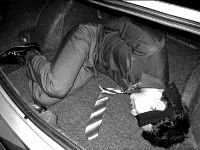Disorganised crime
Disorganised crime is a term used to describe operations run by career criminals, whose work is characterised by slack administrative practices and chaotic working arrangements. These criminal activities are usually conducted for the purpose of monetary gain, although the profits are rarely invested wisely.
Organisational Structure
A typical disorganised crime syndicate is based in and around one major city or one country. However, in recent years, many groups have chosen to outsource some of their work to countries beyond their normal territory. This is because in third world countries, the labour and resources are much less expensive. Also, business trips to Acapulco or Torremelinos are excellent for morale. It can be difficult for crimelords to trust gang members who live out of easy leg-breaking reach, but the economic benefits are clear to see.
A gang is usually run by one charismatic leader, whose often contradictary orders are carried out to the letter. Below this leader there are a succession of vice presidents and deputies who are delegated with the day-to-day activities of the gang. However, their tasks often overlap and with poor communication between the vice presidents, the deputies and each of their assistants and personal secretaries, alongside their team leaders, project managers and departmental co-ordinators, mistakes do happen.
For example, the vice president for contract killing might arrange to rub out a local wise guy, not realising that the blackmailing team had been planning to extort some money off him later in the week. This brings the accounts department into the equation, as they then can no longer supply the ready dough to the gambling unit for betting on the Serbian Basketball League playoff final that they had so carefully rigged. Such sequences of failure do not make their leader happy, so it's a good job that he can never work out which middle manager should take the blame.
A syndicate will typically exhibit a controlling influence over their local governors, police force and judiciary. However, they have to remember to send thank you letters when favours are done. Many disorganised criminals overlook the importance of maintaining good working relationships and this can lead to the development of a toxic atmosphere between the organisation and it external stakeholders. Inevitably, such situations end up with influential gang members getting arrested on some spurious charge, simply because they forgot to invite the local police chief to their Christmas party.
Activities
There are many different types of crime that a disorganised crime syndicate may participate in. This makes for very varied and interesting work and ensures that an organisation's employees really love their job.
Extortion
Extortion, or racketeering, is the procurement of money under coercion. Many gangs will visit local businesses and request money from them in return for "protection". While some mobs occasionally get confused by this term and hand out counterfeit birth control, most mean this as a threat of violence.
With a large number of businesses to extort and a constant stream of new protection money coming in, a racketeering operation can easily turn into an administrative nightmare. Filing is not your typical gangster's strong point and the seemingly straightforward process of filing clients in order of height can, at times, go awry. The problem is compounded by the fact that local businessmen often mislay the receipts for their protection. This all leads to the gang having to refund protection money after issuing an undeserved beating. Customer service is an important part of disorganised crime.
Kidnap
Identify a victim, nab the victim, request a sizeable fee for the safe return of the victim. Kidnapping is the classic method for extracting money from the general public. However, it is also the most high-profile and risky of fundraising strategies. With many different hostages held at different, top-secret, locations, there is always scope for kidnapping operations to run into administrative difficulties. When you consider that often the sites are so top-secret that the addresses are never written down, and you factor in the constant deadlines and the burden of proof to show that victims are still alive, there is always a chance of getting kidnappees confused. No mobster wants to cut off the wrong hostage's thumb, but these people are human beings and are fallible like anyone else.
The toughest part of any kidnapping is the gathering of the ransom. Dropping off unmarked bills at a pre-determined location is the traditional instruction given to the family, but traditionally this is also where the pigs set their trap. Accordingly, many forward-thinking organisations look to harness new information gateways and take advantage of modern workstream processes to optimise reliability in the procurement of funds. In short, they get someone else to do it. Disorganised crime syndicates find that their overseas branches are ideally suited to the job and delegate to them the task of taking a ransom. One relative of a kidnapping victim encountered this practice amongst Chicago's criminal underworld. Unfortunately, the new system was undergoing some teething problems at the time.
| “ | They gave me a phone number to contact about the ransom. I spent six hours on hold listening to the soundtrack from Bugsy Malone, with a message every so often telling me my call was important to them. When I eventually got through, it turned out to be an Indian call center. The woman on the phone barely spoke any English and we couldn't understand each other's accents. I had to spell out my husband's name five times before she understood who I was talking about. Then, after all that, it turned out that they didn't accept my credit card for payment! It was a disgrace! | ” |
Drug Smuggling

The sweet, powdery, snow-white cocaine that your typical rock star or actor relies on to get through the day does not turn up at parties by magic, no matter how magical it may seem at the time. The reality is far more complicated.
These days, the most effective way of importing drugs from overseas is by hiring a drug mule. These invaluable foot soldiers in the war on sobriety are hired or coerced into swallowing a condomful of Colombian marching powder. They then have to board a flight to the required destination without succumbing to one of the bouts of panic attacks or paranoid delusions that are an occupational hazzard of the trade/pastime. This can be a difficult task, and so most disorganised crime syndicates now send their mules on extensive training courses before they see any action.
While they may be transporting a first class drug, a disorganised crime syndicate can't afford to buy their exporters a first class ticket. They are running a business after all. Budget airlines are the carriers of choice for keeping costs down and profits high. However, this practice can bring with it some difficulties.
Budget carriers often land in airports many miles from the city centre. This can make the airport pick-up a lengthy and difficult process for a disorganised criminal. Most mobsters doing the drug run have originally been hired as getaway drivers and do not necessarily have the temperament for rush hour traffic. They are also always forgetting to bring change for the parking meter. That assumes that they get to the airport in the first place, which can be tricky when their sat-nav is a Yakuza hand-me-down that doesn't have an English language option.
Another problem with budget carriers is their tendency to charge unreasonable prices for snacks. If your mule happens to get the munchies mid-flight, then the contraband handover can easily turn into a long bargaining session over expenses; a problem compounded by the fact that the driver doesn't have the change for four packets of mini cheddars. When you combine all these factors, the delivery of nose candy often becomes a race against the clock to get the precious cargo to the fashion show before meal time.
Disorganised Crime Around The World
Russia
If you want to get something done in Russia - whether you want to get out of a parking ticket, buy some cheerfully homemade vodka or sell your daughter into an international prostitution ring - then Nikolay Vilichenko is the man you have to go through. Just don't send your daughter to pick up the vodka on Tuesdays or Thursdays, as that is when his secretary, Valerie, works, and she gets confused. Valerie is 76 now and has worked for Vilichenko, and his father before him, for as long as she can remember: a length of time that varies by the day. Valerie's knowledge and experience is unmatched: she knows where the bodies are buried. Unfortunately she doesn't know who's buried where, as she lost that list when she reorganised the filing cabinets in Spring 2002.
Since the Berlin Wall came down and the peoples of the East were given greater freedom to con each other out of money, Vilichenko's empire has expanded at an impressive rate. From its original base in Moscow, Vilichenko has now opened branches in Minsk, Kiev, Bucharest, Sofia and Walsall. That last one was the result of one of Valerie's typos.
Vilichenko has also been able to diversify his business model and enter into the exciting and lucrative business of electoral fraud. The greater personal freedom of movement that the fall of communism has brought about has also seen a huge increase in profitability in the human trafficking sector.
While it may seem that Vilichenko's current success is entirely down to the precious gift of western-style democracy, such conclusions would unfairly discount the influence of the internet upon his work. Not only has it been a considerable boon for his mail order bride business, but it has also allowed him to conveniently oversee his entire empire over the huge Russian landmass. Gone are the days when he would have to hijack a commercial airliner just to attend a meeting with his Siberian huskie counterfeiters. Vilichenko can now run his operations from the comfort of his luxury superyacht, as it tours round the Mediterranean hotspots of Monte Carlo, Corsica, Corfu, Malta and Crewe.
Nigeria
Prince Obafemi Ogwuru has been the leader of Nigeria's largest disorganised crime syndicate for over 20 years. Over that period, he has been very successful in the fields of people trafficking, prostitution and sports shoe manufacture. However, in recent years, this icon of African illegality has fallen on hard times. His assets have been frozen in an inaccessible bank account and he has been forced to turn to contacts in the disorganised crime community to help him get it back. Sadly, Ogwuru's disorganised nature has repeatedly come back to haunt him. Every time he's tried to get his money back, the operation has failed somewhere between the processing of the administration fees and the planned withdrawal. This has left many a disorganised criminal confused and out of pocket. Ogwuru is still looking for a reliable business partner and has now turned to the general public for assistance. He has designed a special random selection process using Hotmail, which he hopes will find the perfect candidate. Getting an emailed request for help from Ogwuru is like winning the Nigerian lottery, except this one isn't an elaborate cover for illegal chicken-fighting, like the lottery Ogwuru ran in the 1990s.
The Future
The future for disorganised crime is a clear and uncomplicated one. The future is either identity theft, property development, or something to do with celebrities and Twitter. Until someone comes up with a way of making money out of micro-blogging, identity theft is the most popular of the three options. East London mobster Jimmy the Nerd (so-called because he owns a computer) was one of the first disorganised criminals to tap into this market. "I'd never heard of it before," says Jimmy, "But then I got this court order in the post charging me with identity theft. I don't know how they got my name and address. Anyway, after that morning I thought, "I'll have some of that.""
Jimmy now runs a large scale operation, sifting through people's rubbish and taking their personal details. It is a big undertaking, especially in terms of data entry. The information he has compiled is kept on three large databases, which are protected by the password 12345. Ideally, you'd be able to access all three at once and none of them would be on Vista. This is a lesson that Jimmy has now learnt and will look to improve on in the future. But for now, he has the names and dates of birth of his victims on Vista, another database houses their bank accounts and PIN numbers and the third shows their recycling habits. Some of those people are so wasteful; they're destroying the planet and deserve everything they get.
When Jimmy gets all three databases working at once and can find some cases where those stupid temps haven't ruined everything with their stupid typos, The Nerd can get some good fraud work done. Jimmy is running a slick operation and is a role-model for all forward-thinking disorganised crimelords. If it wasn't for the fact that he keeps getting these weird credit card bills, he'd be making some serious money.




